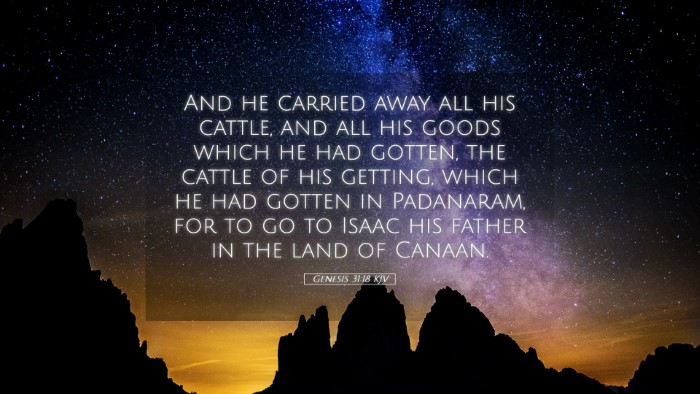Commentary on Genesis 31:18
Genesis 31:18 states: "And he carried away all his cattle, and all his goods which he had gotten, the cattle of his getting, which he had gotten in Padanaram, for to go to Isaac his father in the land of Canaan."
Contextual Overview
This verse occurs in the narrative detailing Jacob's departure from Laban’s land. Jacob, after years of laboring for Laban, decides to leave with his family and possessions. This movement signifies a pivotal moment in Jacob’s life as he returns to his roots and the land promised to him by God.
Theological Insights
Jacob’s actions in this verse reflect a deeper realization of God’s promises and providence. The act of carrying away his cattle and goods symbolizes not only a physical but also a spiritual departure from a place of labor to a place of heritage and divine promise. Each aspect of his departure can be dissected for richer theological insights:
- Divine Claim: Jacob acknowledges that the wealth he has accrued is not merely by his labor but is a fulfillment of God's blessing upon him. The phrase “which he had gotten” emphasizes the providential hand guiding his efforts. Jacob’s possessions are not solely material but are tethered to a covenantal promise.
- Journey of Faith: This verse signifies a moment of faith where Jacob chooses to leave behind Laban and the influences of a foreign land. His journey back to Canaan is an act of obedience to God, echoing themes of faith woven throughout Scripture.
- Family and Identity: Jacob’s return to Isaac, his father, implies a reconnecting with familial identity and heritage. This action reveals that true fulfillment and identity are found in obeying God and returning to one’s roots.
Commentary Insights
Matthew Henry's Commentary
Matthew Henry highlights that Jacob's exit signifies both the culmination of his time with Laban and the fulfillment of God’s promises. He notes that “carrying away” his possessions demonstrates a clear break from his former life. Henry emphasizes the spiritual significance of leaving behind worldly attachments to pursue a God-ordained path. He further reflects on the importance of being proactive in one’s faith and the necessity of departing from that which hinders spiritual growth.
Albert Barnes' Commentary
Albert Barnes expounds on the implications of Jacob's actions in this verse as not merely a logistical undertaking but as a profound symbolic act of relocating toward the promises made to him by God. Barnes emphasizes the reality that Jacob had gained wealth through divine blessing rather than mere manipulation or deceit. He also highlights the risk involved in Jacob’s journey, showcasing the tension between trust in God’s promise versus the fear of potential retaliation from Laban.
Adam Clarke's Commentary
Adam Clarke provides a comprehensive analysis of the socio-economic context of the time, indicating that Jacob's wealth represented a significant achievement in an agrarian society. Clarke notes the contrast between Laban's deceptive practices and Jacob's honest dealings. He also reflects on Jacob's motivation, underscoring that Jacob's motives to return are intertwined with the divine directive he receives from God, establishing a poignant connect between faith and action.
Application and Reflection
The reflections on Genesis 31:18 yield valuable insights for contemporary readers, particularly for pastors and theologians:
- Prioritizing God’s Call: The narrative encourages believers to prioritize God’s call over worldly attachments or comforts. It serves as a reminder that true obedience often requires difficult decisions and leaving behind familiar spaces.
- Faith in Action: Jacob's journey illustrates that faith must be active. It compels individuals to step out of complacency into a journey that God has ordained for them.
- Understanding Blessings: The acknowledgment that wealth and success come from God serves to elevate our understanding of blessings. It invites believers to a deeper appreciation of the covenantal relationship established by God.
Conclusion
Genesis 31:18 encapsulates critical themes of divine blessing, faith, and the importance of returning to one's roots. As Jacob departs from Laban, he exemplifies a journey not just of the body but of the spirit, guided by God's promises. Through the insights of Matthew Henry, Albert Barnes, and Adam Clarke, we recognize the multifaceted layers of meaning in this verse, encouraging a deeper understanding and personal application of God’s Word in our own lives.


